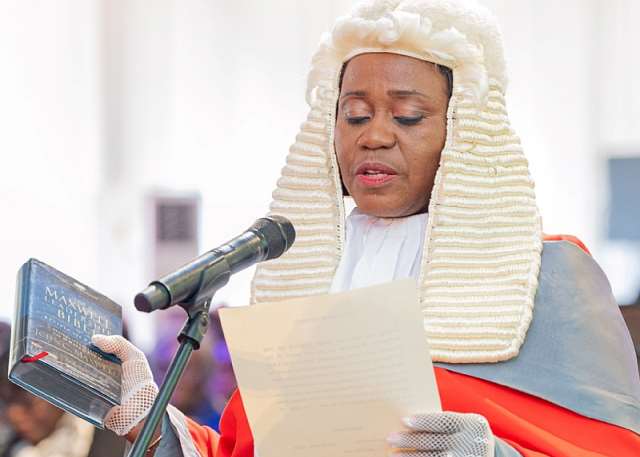A Legal Practitioner and Civil Rights Activist, Noah E. Tetteh, has challenged the argument that the Chief Justice (CJ) of Ghana has the right to demand a public hearing in proceedings concerning her potential removal from office under Article 146 of the 1992 Constitution.
In a sharp legal commentary, Mr Tetteh contended that the confidentiality provision embedded in Article 146 is not a personal entitlement that the CJ can waive but a constitutional mandate that protects the collective interest of Ghanaians.
“It is basic legal knowledge that inherent in the idea of a right is the right of the rightsholder to waive the enjoyment of that right. But whilst we are at it, we must distinguish carefully between rights held by individuals (even when the right is attached to an office) and rights held by society for a collective interest.”
Noah E. Tetteh, Legal Practitioner and Civil Rights Activist
His remarks come following the Chief Justice’s legal team requesting that her impeachment proceedings be conducted in public rather than behind closed doors.
The request, they argue, is anchored in the idea that the CJ has a constitutional right to waive the confidentiality of the process in favour of transparency. But Mr Tetteh insisted this argument is “fundamentally flawed” both legally and constitutionally.
According to him, Article 146, which outlines the procedure for removing justices of the Superior Courts—including the Chief Justice—clearly stipulates that such proceedings must be conducted in camera.

While some interpret this as a personal right that the CJ can opt out of, Tetteh disagrees vehemently, pointing to the jurisprudence in Paul Dery v Tiger Eye as precedent.
“In the landmark case of Paul Dery v Tiger Eye, the court rightly clarified that the purpose of in-camera proceedings under Article 146 is not to protect the personal interests of the judge involved. Rather, it is to preserve the integrity of judicial administration. And guess what? Who is the fountain of justice? THE PEOPLE.”
Noah E. Tetteh, Legal Practitioner and Civil Rights Activist
By extension, Mr Tetteh argued that the reason for in-camera proceedings is rooted in collective interest, not individual protection.
He further warned that public hearings in such sensitive matters—even if they conclude without recommending removal—can cause irreparable reputational harm to the CJ, thereby eroding trust in the judiciary.
He underscored the point that even the perception of impropriety in the judiciary can weaken public confidence in legal institutions, making confidentiality in such matters a matter of national interest rather than personal convenience.

Constitutional Requirement
Moreover, the legal activist argued that the constitutional requirement for confidentiality is not optional, asserting that Article 146 does not give the President or the Chief Justice discretionary powers to convert the proceedings into a public spectacle.
“Ghanaians made their collective voice heard through the Constitution and they chose in-camera proceedings. This is not a preference. It is a constitutional command.”
Noah E. Tetteh, Legal Practitioner and Civil Rights Activist
He contended that the duty imposed by Article 146 on the President is to ensure that the process is carried out in accordance with the law, not to exercise discretion or entertain waivers.
For him, neither the President, nor the Chief Justice, nor even the public has the legal latitude to bypass the strictures of the Constitution unless through a formal amendment process.
“So let’s be clear: the right to a private hearing under Article 146 is not waivable. Because it is not an individual right. It is a collective right intended to safeguard judicial administration.”
Noah E. Tetteh, Legal Practitioner and Civil Rights Activist
His analysis strongly rebukes those who advocate for a more public, possibly politically motivated process and casts doubt on any hopes of holding open hearings in such constitutionally sensitive matters.

Mr. Tetteh’s stance reflects a wider understanding of the function of institutions in democratic governance in addition to constitutional fidelity.
In conclusion, Mr Tetteh noted that the seemingly request for transparency is a constitutional minefield, asserting that Article 146’s requirement for confidentiality serves as a shield to protect the Republic, not as a veil to shield the Chief Justice.
Mr. Tetteh cautioned that any departure from this clause would not only be against the Constitution but also undermine the very legitimacy of the judiciary that it aims to uphold.
READ ALSO: Ghana’s Energy Transition to Cost $562 Billion by 2070



















